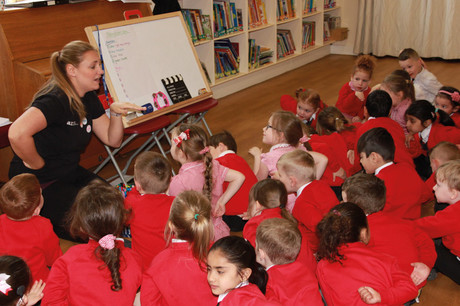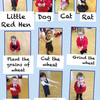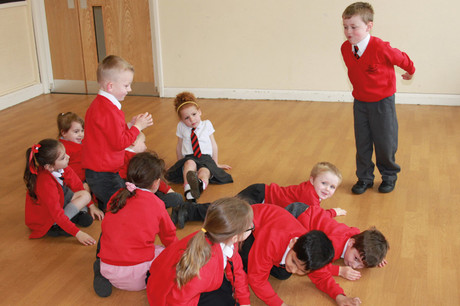
We were not quite sure what to expect when Murmur – aka Lucy Parsons, of performing arts company Artis – welcomed us into the school hall and asked us to copy her movements, by waving our arms and walking tall and low. However, within minutes, the children were completely in love with her and were soon acting out a story.
Lucy’s drama sessions have helped us to fulfil various aims: to respond directly to feedback from Ofsted; to continue our efforts to improve our whole-school curriculum; and to spend our Pupil Premium monies in a way that was innovative and would benefit all pupils.
About a third of our children are eligible for the Pupil Premium. In Reception, that number is 17 per cent, while in nursery, 15 per cent qualify for the Early Years Pupil Premium (EYPP).
Our 2013 Ofsted inspection had graded us as Good with Outstanding features. One area identified as needing improvement was writing, with the report noting: ‘Progress over time in writing is not as fast as in reading and mathematics, especially at Key Stage 1. Pupils do not always use grammar and punctuation accurately.’
Our head teacher Fiona Ward learnt of Artis at a conference. We then decided to trial drama sessions during the autumn term, using some Pupil Premium and EYPP monies to fund it. Linked to our book of the week, the sessions aim to support our Talk4Writing strategies and target specific writing outcomes.
We quickly realised the huge impact that Lucy was having on our Foundation Stage, and older, children, so we booked her for extra sessions.
Our head teacher believes it has been money well spent. She says, ‘Our work with Lucy and Artis has been successful in so many ways. It has provided excellent continuing professional development for teachers, has had a fantastic impact on children’s self-confidence and ensured our children have begun their journey, within the early years, as confident oral and written communicators.’
IN PRACTICE
Staff first attended training to learn about the sessions and to get to know Murmur. She now spends a full day each week with us, taking early years and Key Stage 1 children for 40 minutes each in the morning, and Key Stage 2 for an hour each afternoon.
To ensure the sessions are meaningful and purposeful, the teachers send Murmur their medium-term and weekly planning, from which she plans an inspiring and creative session. On the day, she checks if any of the plan has changed and adds any children’s ideas that have arisen.
After a warm-up, Murmur introduces the children to the theme of the session, usually through mime and music. She then gathers ideas from the children to ensure the child’s voice is heard. All the children then act out some key parts of the story, before performing with a partner or in a small group. Finally, Murmur selects children to perform the story with the rest of the children as the audience.
 The day before the session, we introduce the book and the ideas for the week based on the text, and Reception children do a focus activity based on the story. The following day, we recap the session, using photos to remind the children what we did and all the actions involved.
The day before the session, we introduce the book and the ideas for the week based on the text, and Reception children do a focus activity based on the story. The following day, we recap the session, using photos to remind the children what we did and all the actions involved.
As Talk4Writing is used heavily throughout our school, we build this into our recapping of the session, often using photos of the children to make a story map. The nursery children are encouraged to draw and mark-make linked to the story, while Reception children complete Big Writing, working up to writing parts of a story as we aim for children to be exceeding the early learning goals.
Staff also write a blog after each session, so that parents can see what their children have been doing, and comment if they wish. This has proved a lovely way to build a rapport with parents, as well as a dialogue about learning both at home and school. The blog is updated in the week to include examples of the children’s literacy.
Our nativity performance and end-of-year graduation have both been supported by Murmur, so parents have also been able to witness the children’s growing confidence and performance skills.

IMPACT
As well as improving children’s writing, the drama sessions have had a huge impact on their speaking and listening skills and PSED. Initially, some children were unsure of how to work with a partner and within a large hall. Some were initially uneasy about performing, but now all have been willing performers. It has been a pleasure to see how they’ve changed. All staff have commented on how some of the least confident and quiet children in early years have really shone in the drama sessions.
Lucy has also benefited from the experience. She says, ‘The impact of the work has been rewarding for both the children and myself. I have seen a vast improvement in the children’s speaking skills. They are growing in confidence each week and their enthusiasm and imagination encourage me to teach better. I have seen how the children have engaged positively in my sessions, which is then reflected in their writing. I am honoured to have progressed as a teacher and worked with the children at Littletown.’
SUPPORTING ROLES
For guidance on how to develop drama and storytelling in your setting, see:
Books
Supporting Children’s Creativity Through Music, Dance, Drama and Art: Creative conversations in the early years by Fleur Griffiths
Drama 3-5: A practical guide to teaching drama to children in the Early Years Foundation Stage by Debbie Chalmers
Supporting Drama and Imaginative Play in the Early Years (Supporting Early Learning)by Lesley Hendy
Start With A Story… Traditional Tales Creating Music, Movement & Drama for Early Years (Book & CD) by Ann Bryant
Blogs and interviews
For information on the work of Vivian Gussin Paley and the importance of dramatic play:
www.naeyc.org/content/conversation-vivian-gussin-paley
Getting Back on Track: The Importance of Play and Storytelling in Young Children’s Development, www.learninglandscapes.ca/images/documents/ll-no13/paley.pdf
The Arts: An Interesting Approach in the Early Years Settings by Evgenia Theodotou, www.bera.ac.uk/blog/the-arts-an-interesting-approach-in-the-early-years-settings
Organisations
Theatre companies and organisations offering training include:
www.artsconnect.co.uk/moonbeams-seminar-on-theatre-and-drama-for-early-years
www.artsonthemove.co.uk/education/primary/earlyyears.php
http://stateofplayarts.co.uk/early-years
www.freshwatertheatre.co.uk/sessions.php?ref=early-years-drama
http://earlyarts.co.uk/drama-versus-storytelling-whats-difference-early-years
www.polkatheatre.com/editorial/early-years-theatre
MORE INFORMATION
@LittletownEYs
@LittletownSch
http://littletownschool.primaryblogger.co.uk/category/drama-and-writing-with-murmur
www.artiseducation.com – Please mention this article when contacting them
www.andrelleducation.com/big-writing
Helen Chilton is deputy head and SENCO, SLE at Littletown Junior, Infant and Nursery School in Liversedge, West Yorkshire









